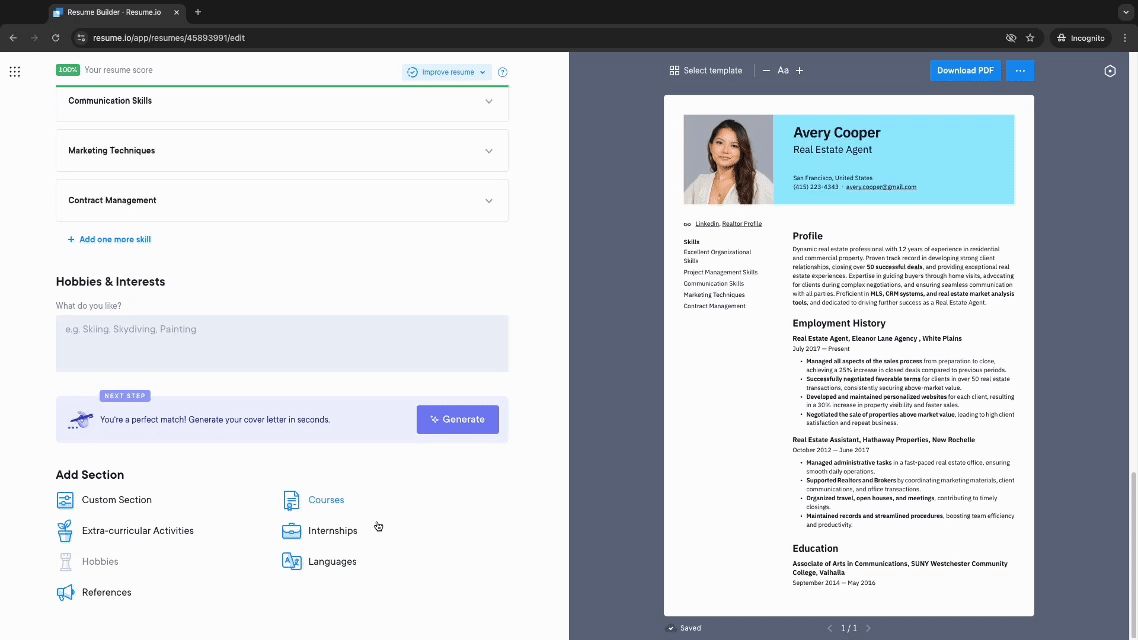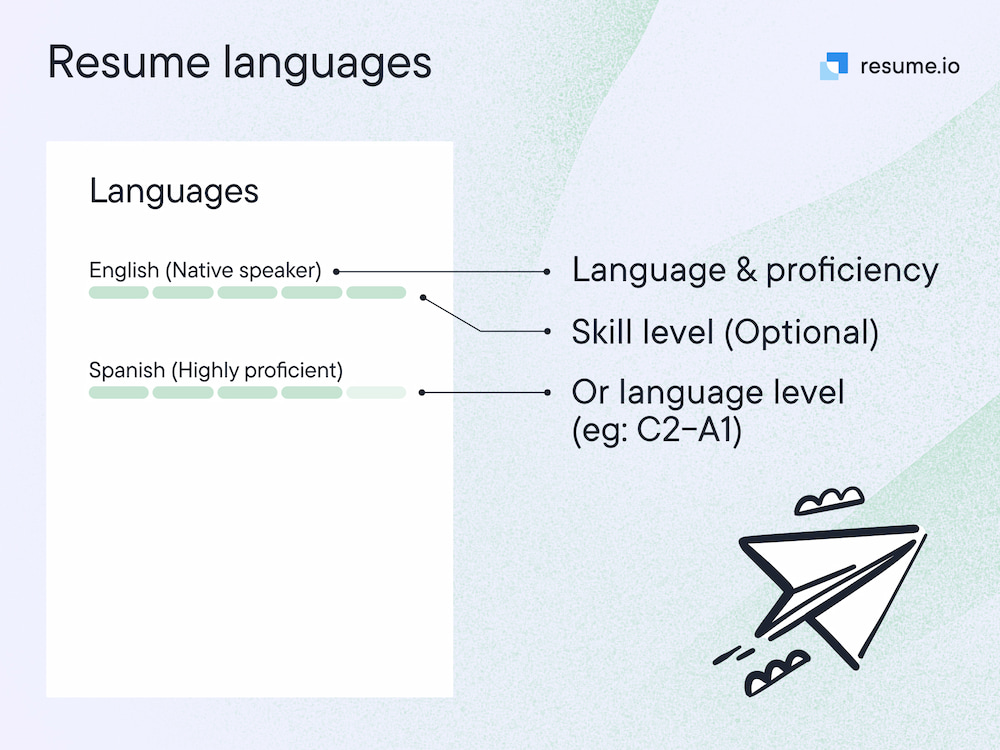If you’re part of the more than 50% of the world’s population who speaks more than one language, you’ve probably wondered how to list languages on your resume. Your language skills could well be the missing link for your next boss.
This guide will go over:
- Whether or not you should include languages on your resume
- Understanding and writing about language fluency on a resume
- Examples showing various ways to include language skills on a resume
Should You List Languages on Your Resume?
The short answer depends on two things:
1. Your level of proficiency
2. How the language relates to the position
Make room for languages on your resume when it is a requirement for the position or feature it in a secondary area when it supports your professional skills. Employers like to know if you have a working capacity in other languages and it can be an added bonus in your application even if it’s not a requirement.
If your language proficiency ranges from professionally conversational to native (essentially, intermediate to advanced), it has a place on your resume. Whether you’re applying to be a barista or a senior marketing manager, a second language can help you communicate with customers, clients, and foreign offices.
Tailor your resume to the position, highlighting your language skills more or less depending on how much language lends to the role and is mentioned in the job posting.
Demand for bilingual employees spreads across the job market, from service positions to C-Level directors. That demand is growing quickly. In fact, 9 of 10 employers responding to a recent survey said they rely on English-speaking employees who also speak another language. That same survey (by Ipsos Public Affairs for the American Council on the Teaching of Foreign Languages or ACTFL) found that employers expect their need for multilingual employers to continue to grow.
How to assess your skill: language levels resume

You took Spanish in high school or maybe even in college. Does that qualify you to list Spanish as a second language on your resume? It depends.
While you can prove soft skills like communication and organization over time, you can’t exactly skirt around being fluent in French. Before you find a home for languages on your resume, honestly assess your up-to-date comfort level with each language you’ve studied.
Language proficiency generally follows a 0-5 system:
0 – No proficiency. You’ve never studied the language
1 – Elementary. You can hold your own in very basic exchanges, such as greetings, asking for directions, etc. This level is typical for visiting another country and feeling confident getting around.
2 – Limited Working. Personal conversations come a bit more naturally, but your vocabulary is not necessarily extended to professional or complex topics.
3 – Working Professional. You can confidently chat with clients on the phone or make presentations in that language. It may still be clear that the language is not your native tongue, and you need assistance with certain phrases or vocabulary.
4 – Full Professional. At this level, you can weave between professional and personal topics with ease. You no longer need assistance translating complex ideas or terms and managers can trust you to hold your own in independent exchanges with clients.
5 – Native. The language is such a large part of your daily life that you barely have an accent and can assist others with translation. This level is typical of those raised on the language or have spoken it regularly for a large portion of their lives.
Although levels 1 and 2 are a step in the right direction, they rarely have practical application in an office setting—at least enough to mention on your resume. If the question were to come up in an interview specifically, it’s fine to show your dedication to learning and improving your language skills.
Overall, only list languages on your resume if your proficiency falls between levels 3 and 5.
How do you describe language skills? Rather than rely on a list of your various linguistic qualifications, use language that a hiring manager would understand. Phrases such as "working professional" and "full professional" are much more useful than an IELTS or TOEFL qualification that they many may not understand. Alongside a widely understood language framework, this will offer the fairest assessment of your level. Equally, although you may have studied a language five years ago at university, be honest about your current level.
How to list languages on your resume

So how do you list languages in your CV? There are several ways to include your language skills. Some of them depend on which of the three formats of resumes you choose.
1. Language Sidebar. Information on a resume sidebar catches the eye, making the reader feel like it’s in a special spot for a reason. If the position specifically calls for language proficiency—and you meet the mentioned proficiency level—consider listing your languages in the sidebar.
In many of our resume templates, you can list skills and languages above the level of proficiency through the use of icons or bars. Either choose to create a full list of languages—if you speak multiple ones—or meld skills and language list into one sidebar display.
In this case, it may look something like this:
- Spanish ★★★★★
- French ★★★★☆
- German ★★★☆☆
2. Within work experience. As you detail your skills and responsibilities underneath each job title, include a bullet point about your language use throughout the position. As always, stay honest—if a past employer ends up as a reference, language use could come up.
If language is a large part of the job requirements, place it toward the top of your responsibility list. Hiring managers may be looking for keywords as they make their initial pass over your resume, and including these phrases prove you understand the level of language proficiency they’re looking for.
For example:
Product Manager, Super Solutions January 2014-January 2018
- Managed online and in-person correspondence with clients in France, acting as office point-person for French translation and negotiations.
3. Education. If studying a second or third language was a large part of your formal education—especially if it was a major or minor—note your language training in your education section as well. This could also expand your resume if you recently graduated and are looking to include unique information that speaks to your passions. In this case, you may consider including language honor’s societies, clubs or trips abroad where you stretched your language muscles in a practical setting.
In resume templates with a large focus on educational information, you may even detail your language studies and applications below the school name if you believe the hiring manager will benefit from learning more about this experience.
For example:
University of Southern Florida
Bachelor's in Finance
- Minor in Spanish and International Relations
- President of Spanish Society
- Studied abroad with student organization in Argentina
4. Within special skills or personal details. As mentioned above, you can also weave language training and experience into the special skills or personal details list toward the bottom of your resume. This is best when speaking the language is not the focus on the position but could still give you an edge over other candidates. In a special skills area, give a detailed view of your language skills through activities or post positions.
For example:
"Native Spanish speaker with four years volunteering at local ESL community organization"
A final word: Clearly mark proficiency. No matter where it lands, include a note or icon denoting your proficiency in your current understanding of the language. Though you may have been a champ at speaking Italian in college, there’s no way for an employer to know how much you’ve kept up your language skills since. This also proves that you understand the necessary level of proficiency for the job.
Wording might include:
“Professional working proficiency of German with a decade of on-the-job experience collaborating with German-speaking clients and vendors.”
Be prepared to speak the language in an interview. If you are applying for an international role where languages are important, be prepared for an interviewer to test your proficiency. There may well be written tests which form part of the interview process. Don't lie about your proficiency - you will be found out at some point.
Language skills CV: what businesses want
It’s great that you know a second language. It will definitely increase your career options. You may also consider adding language skills or beefing up level 1 or 2 knowledge you have of several languages. Your time is valuable so choose wisely. Which languages are in high demand by businesses?
A resume.io survey of multiple language learning and business sites found these languages were common to all lists of best languages to learn for business:
- Mandarin
- Spanish
- German
- Arabic
Other commonly mentioned languages are:
- French
- Portuguese
- Hindi
From 2010-2015 the number of jobs requiring Mandarin speakers tripled, according to New American Economy. In the same period, Spanish and Arabic as desired language skills rose 1.5 times in job listings.
Use your languages to talk about your appreciation for diversity and other cultures. Learning a language often involves experiencing other cultures and seeing the world from a different perspective. These are valuable transferable skills for any workplace, so be sure to expand upon the wider benefits that language learning has brought to your life. Interpreting words from a speaker's perspective is a skill that many sadly lack.
Languages on your resume as a career tool
How valuable are language skills on your resume?
As our world connects more and more every day, communicating with one another is becoming a higher priority. If you’re already ahead of the game with fluency in a second or third language and it's relevant to the position, this is a competitive advantage and you should consider including languages on your resume in the most effective way possible.
Consider this: Since February 2020, when the global pandemic began, FlexJob listings for remote jobs requiring bilingual workers have jumped 30%, according to TechRepublic.
Should I list my conversational Spanish if it has no relation to the job? If your basic level of language proficiency has no relation whatsoever to the job that you will be performing, there is no more value in listing it than any other of your hobbies. If you decide to add a little more personality to your resume, then this is fine, but you should know that it will serve no real purpose other than telling the hiring manager a little more about you.
Key Takeaways
While the job description might not include a requirement for a foreign language, you never know which opportunities may come along down the line. Language skills can open doors - for you and for your employer.
Being able to call attention to your language skills on your resume may just get you the opportunity you’ve been looking for.





































